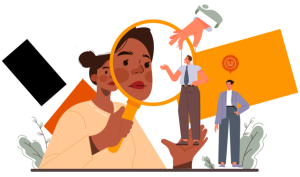October 2023
Banker and her colleagues in New York conducted a study, exploring if misophonia could be connected to the way people try to control their social interactions in situations they can’t control, and whether they have a stronger dislike for social norm violations in those situations compared to when they can control things. Controllability means how much power you have to make things go the way you want. If you can easily make something happen the way you like, it’s high controllability. If it’s tough or even impossible to make things go your way, it’s low controllability.
 The image was adopted from underscore-group.com
The image was adopted from underscore-group.com
They found that misophonia is linked to a feeling of not being in control. The study used questionnaires and tasks to see how misophonia is connected to other conditions like obsessive-compulsive disorder (OCD). People with misophonia tend to feel like they have more control over things than they actually do, and they get upset when things don’t go as they expect.
The study also found that misophonia response is often triggered by social sounds, like those made by people(e.g., chewing, lip smacking that can happen in a dinner table by other people), rather than non-social sounds(e.g., sound of faulty ventilation). People with misophonia often avoid social situations that might trigger their symptoms. Interestingly, even though the study showed that misophonia is different from conditions related to social problems like OCD, which seems to have different genetic roots (read more about it here), it appears that both disorders share a common need for control in unpredictable social situations. This desire to control their environment could explain the strong reactions observed in misophonia. When people feel like they’re in control and then encounter a sound that they can’t control or disturb their control, it can lead to anger, withdrawal, agitation, or anxiety.
The study also found that symptoms related to disrupted impulse control (the ability to manage and resist sudden urges or impulses to do something, especially when it’s not a good idea) and negative emotions are seen in various disorders, including misophonia and OCD. This suggests that there’s a common element related to control in these disorders. The reason they compared misophonia and OCD is that the authors conducted a statistical analysis to group similar psychiatric disorders, such as depression and autism spectrum disorder (ASD), with misophonia. They found that among all these disorders, only OCD could be grouped with misophonia because of their similar symptoms.
However, the study has some limitations. They used questionnaires and online data, which may not always be accurate. Also, the study didn’t look at real-life situations that trigger misophonia. Participants in the study were not selected based on specific diagnoses, so the symptoms found should be seen as general traits rather than signs of confirmed psychiatric disorders.
In conclusion, this study looked at the relationship between misophonia and other psychiatric conditions and found that a feeling of control plays a key role in misophonia. Future research should explore this further, including the brain mechanisms behind this lack of control and whether treatments used for other control-related disorders could help with misophonia.
What to do if you have misophonia?
Misophonia is a real and highly debilitating disorder that can have a significant impact on individuals’ lives, and it can be challenging to manage without support. If you or someone you know is struggling with misophonia, it is essential to seek help from healthcare professionals who understand the disorder and can provide effective treatment options.
This review is written by Dr. Mercede Erfanian, PhD – research fellow at Hashir International Specialist Clinics & Research Institute for Misophonia, Tinnitus and Hyperacusis.
